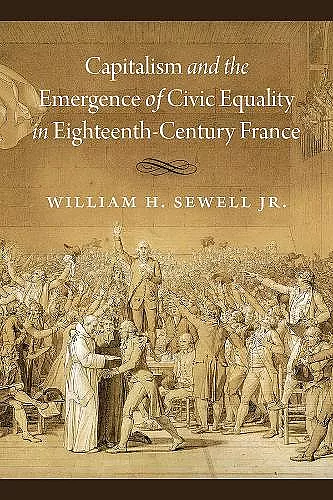Capitalism and the Emergence of Civic Equality in Eighteenth-Century France
Format:Paperback
Publisher:The University of Chicago Press
Published:28th Apr '21
Currently unavailable, and unfortunately no date known when it will be back

There is little doubt that the French Revolution of 1789 changed the course of Western history. But why did the idea of civic equality—a distinctive signature of that revolution—find such fertile ground in France? How might changing economic and social realities have affected political opinions?
William H. Sewell Jr. argues that the flourishing of commercial capitalism in eighteenth-century France introduced a new independence, flexibility, and anonymity to French social life. By entering the interstices of this otherwise rigidly hierarchical society, expanded commodity exchange colored everyday experience in ways that made civic equality thinkable, possible, even desirable, when the crisis of the French Revolution arrived. Sewell ties together masterful analyses of a multitude of interrelated topics: the rise of commerce, the emergence of urban publics, the careers of the philosophes, commercial publishing, patronage, political economy, trade, and state finance. Capitalism and the Emergence of Civic Equality in Eighteenth-Century France offers an original interpretation of one of history’s pivotal moments.
"[An] ambitious work. The result of years of reflection... it presents a compelling vision of the way a specifically French variety of capitalism developed in the 18th century, and how resulting forms of social experience in turn laid the groundwork for a new, revolutionary politics." * London Review of Books *
"In this ambitious book, Sewell argues that the development of capitalism in eighteenth-century France led to the rise of civic equality and its triumph in the Revolution. . . .[The book's] strength derives from its ability to synthesize secondary literature from intellectual, political, social, and economic history seamlessly. Sewell combines this literature with published primary sources to produce a rich description of several realms of French society; intellectual and social biographies of four philosophes; and a political, institutional, and economic narrative of the coming of the French Revolution. He leaves no doubt that commercial relations were expanding through more of society in the eighteenth century and that the belief in civic equality had become central to political thought by the time of the Revolution." * Journal of Interdisciplinary History *
“This superb book will be recognized immediately as a classic in the rich historiography of the French Revolution. It is the first major rethinking of the relationship of the old regime to the Revolution since Furet’s Interpreting the French Revolution was published four decades ago. Sewell’s book is elegantly and lucidly written, persuasively argued, and of fundamental importance for scholars in the broad spectrum of humanistic and social scientific disciplines who seek to understand the major transformation that gave birth to modern political culture.” * Keith Michael Baker, Stanford University *
“Sewell offers a detailed history of how our world, through the proliferation of physical objects, came to be experienced as less concrete and more abstract. Ranging from promenades to taxation by way of fashion, philosophes, and political economy, this magisterial synthesis shows that eighteenth-century capitalism both profoundly challenged existing regimes of privilege and, eventually, created entire new ones.” * Rebecca L. Spang, Indiana University *
“In his bold rethinking of Marx, Sewell restores capitalism to the debate on the origins of the French Revolution. With his signature clarity, he offers us a novel interpretive framework for understanding how subversive notions of equality upended a traditional society to ignite the Revolution. This book is essential reading for all French historians, social theorists, and students of capitalism.” * Michael Kwass, Johns Hopkins University *
"It is impossible to do justice with a short summary to the subtlety, sophistication, and
persuasiveness of Sewell’s book, which may well be his magnum opus. It contains pointed excursuses on major theorists, from Tocqueville to Habermas; remarkable syntheses of recent work on the eighteenth-century French economy; lively biographies of four Enlightenment figures (Voltaire, Diderot, Morellet, and Rousseau), examined from the point of view of their personal finances; and chapters on French tax policy and economic reforms. . . This is an ambitious book, proposing no less than a new economic explanation for the French Revolution." * The Journal of Modern History *
"Theoretically stimulating and cogently written. . . William H. Sewell Jr. offers an unapologetic Marxist analysis of how France came to reject hierarchy and privilege to embrace civic equality and human rights." * International Review of Social History *
"Sewell’s book offers a powerful explanation for why a society so essentially organized around status hierarchy and birth-based privilege could imagine that it was both possible and desirable to reconstitute itself upon the twin principles of legal uniformity and civic equality." * History: Reviews of New Books *
ISBN: 9780226770468
Dimensions: 229mm x 152mm x 28mm
Weight: 594g
416 pages